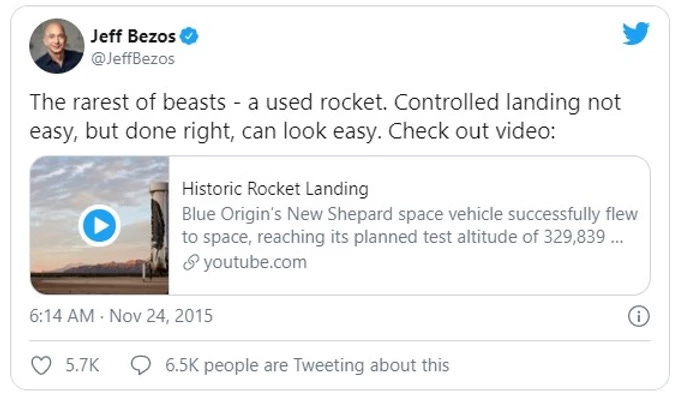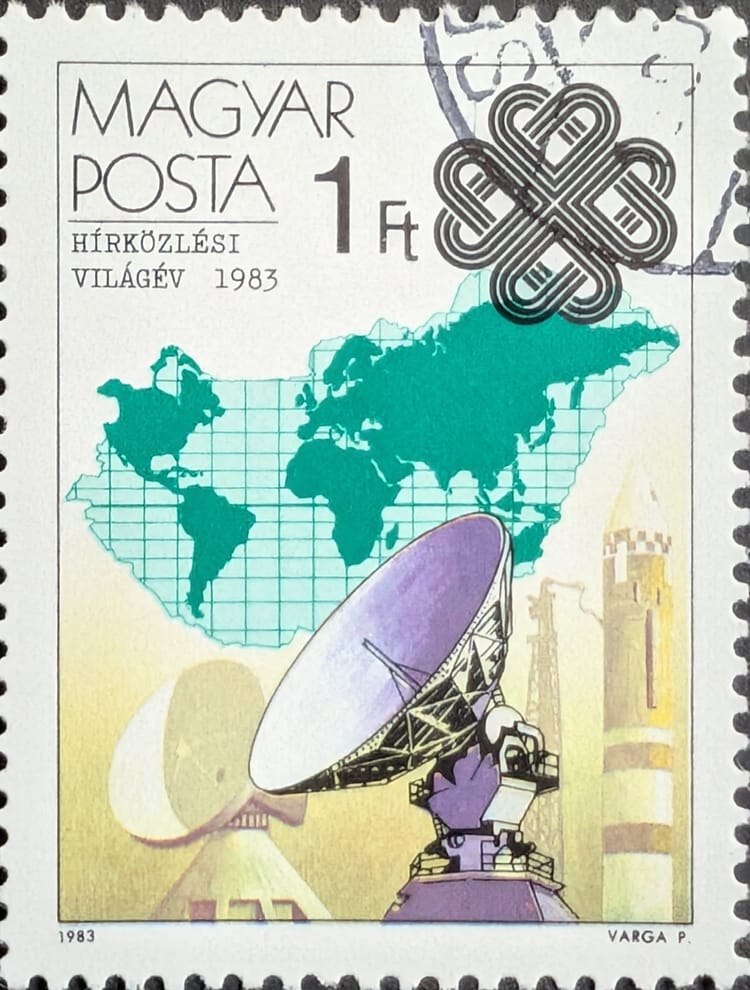Blue Origin: Old Space in New Space Clothing

Sitting at my desk Tuesday afternoon, waiting for SpaceX to launch its Starship rocket prototype, it’s easy for the mind to wander. The prototype was supposed to launch to an altitude of 12.5 kilometers. If it survived that primary task, it would conduct a few more maneuvers to test if SpaceX has dialed in Starship’s landing ability. No matter the outcome, it would be cool to watch. Here was a company that has a short but established history of getting things done.
If this Starship test results in data showing off-nominal performance, SpaceX will take it in stride, learn, and build a better Starship--rapidly. It’s one of the few launch service providers embracing and successfully implementing this singular “test as you fly” ethos. This observation is where the wandering mind comes into play. The inevitable question comes to the fore: are there any other launch service providers in the world demonstrating similar traits to SpaceX?
Would it be possible for a company to be as active as SpaceX without the world hearing about them? There are many examples of entrepreneurs touting to be the “XX version of SpaceX.” China’s entrepreneurs have tried to tie that association to them many times. But aside from press releases with exciting-looking CAD-generated images, none manage to earn that title (which incidentally gives the lie to the whole “China’s Space Industry is Beating U.S. Supremacy” narrative).
Blue Origin--a Slower SpaceX?
As I, and others, watch SpaceX now (because it’s the only company that is fundamentally changing the industry), I am reasonably confident we’d watch any similarly-acting companies at least as closely--if they existed. For a while, Blue Origin appeared to be following a close, if a bit more organized, path. Both companies’ leaders, Jeff Bezos and Elon Musk, are successful key players and influencers in the growing tech sector. They began their space efforts close in time as well.
Blue Origin was founded two years before SpaceX, giving it a headstart for building rockets. The company appeared to make headway, launching and landing its New Shepard suborbital rocket (a first) in 2015. It was history-making, and Blue Origin’s founder and patron, Bezos, couldn’t help but publicly comment on his company’s feat:

Musk’s company, SpaceX, successfully launched and landed its first rocket about a month after Blue Origin’s success. Since that event, SpaceX has launched variations of its Falcon 9 rocket ~81 times during the last five years. Out of the 68 attempted landings SpaceX attempted, it succeeded 62 times. The company introduced the Falcon Heavy, successfully launching it three times. SpaceX is also building, deploying, and operating low Earth orbit (LEO) broadband satellites. The company is in the middle of building and testing its Starship/Super Heavy launcher. When Starship becomes operational, it will be less expensive to operate and launch than the Falcon 9. The company's activities and pacing are daunting.
Meanwhile, Blue Origin hews to a different ethos, captured in its motto “Gradatim Ferociter” (step by step ferociously). First, let’s just acknowledge that this is the type of mission statement risk-averse organizations and managers love. That motto is pure, sweet Kool-Aid designed for direct-injection into the U.S. government’s mission assurance jugular. It assures the risk-averse of something they are already used to--trading time for mission accomplishment (hoping that the time will be spent to increase the mission’s chances).
The difference and motto become explicit when comparing Blue Origin’s progress to that of SpaceX. In the five years since it first launched and landed New Shepard, Blue Origin has launched New Shepard 11 times. The company has made much about building its new rocket engine, the BE-4, and New Glenn. Blue Origin introduced New Glenn, its reusable rocket, in late 2016. New Glenn would be able to launch 45 metric tons to LEO, about double the Falcon 9’s capacity. Initially slated to be operational in 2020, New Glenn’s first launch has been rescheduled sometime in 2021.
That schedule highlights another reason for SpaceX not to worry about competition from Blue Origin: the company has yet to conduct actual launch operations for an orbital rocket. While Blue Origin’s New Glenn has potential, by the time it is test-launched SpaceX will have already launched a few Starships and possibly a few Super Heavies. The reality is that New Glenn will require working out kinks in its launch processes and technologies after its first launch.
New Glenn may fail on its first launch because new rockets have a history of doing that. Even if it’s first launch is successful, that does not mean there are no kinks with the rocket. Blue Origin’s deliberate pacing will likely push a second launch by as much as a year. The delay gives a fast-moving company like SpaceX a lot of breathing room--which it will use to its great benefit.
Slow, Good, and...Non-Competitive?
Based on the comparison, it’s obvious Blue Origin’s “Gradatim Ferociter” is just a fancy take on the legacy space launch industry’s “do you want it fast, cheap or good: pick two” narrative.
For too long, legacy U.S. space companies like Boeing, Lockheed Martin, and Northrop Grumman have used that narrative to increase prices, justifying those increases by presumably providing decent products. Instead of picking two, the government is stuck with one choice--increasing expenses--as those companies are never fast. But maybe that’s okay because their big customers, the U.S. military and NASA, don’t move quickly either. It appears that Blue Origin is just another flavor of those companies.
It makes sense for Blue Origin to follow--step by step ferociously--in those companies’ footsteps. After all, they make enormous profits from their government contracts. The contracts are seemingly evergreen, guaranteeing some kind of annual income that shareholders love. Their customers also seem to return, almost blindly, to them for products, despite cost increases and schedule delays. Why wouldn’t Blue Origin pursue a customer with a large pocketbook and a history of loyalty to low contractor performance expectations?
Increasingly it’s clear Blue Origin will not be a competitor SpaceX needs to worry about. It's also not the competitor the global launch market needs. The first is a shame because SpaceX thrives on competition and both would benefit from each one trying to outdo the other. The second is also disappointing because lower-cost, more responsive launch options would change the world. Blue Origin’s actions make it appear it is content with working in a lucrative niche market focused on government business instead of expanding a global launch market.
Blue Origin is not aiming for the same customers that SpaceX is courting, even though the company has won contracts from commercial companies. New Glenn will not be cheaper to launch than SpaceX’s Falcon 9--at least not initially. Note that not one of the people involved in Blue Origin’s newest space initiative--space advisors--are known for their expertise in reducing space launch costs and understanding commercial markets. Their selection, instead, is another step towards validating the old-school business model (which makes money).
When I started this analysis, I wondered if Blue Origin’s slow pacing resulted from Bezos’ apparent treatment of the launch business as a hobby.
I now believe he is treating Blue Origin as a business--one designed to attract government customers with its methodical pacing and not much more. Blue Origin’s New Glenn won’t change the industry, despite the rocket’s advertised reusability--that’s never been what the company is about. Instead, Blue Origin’s steps appear to be on the road to it becoming interchangeable with the established companies the company is competing with. It is not intended to be the new SpaceX, but rather an updated ULA.
In the meantime, SpaceX is competing with itself. Starship’s only real competition is the Falcon 9. If Starship can launch and land as often, or more often, than the Falcon 9 (as Musk has stated it will), that will make the Falcon 9, one of the most capable rockets in operation today, obsolete.
By the way: the Starship test I was waiting for aborted that evening. But it successfully launched the next day (even if the rocket is no more).




Comments ()